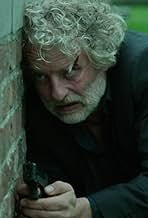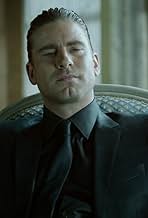IMDb RATING
7.5/10
2.5K
YOUR RATING
A police inspector investigates the robbery of 66 safe deposit boxes at a private bank in Brussels.A police inspector investigates the robbery of 66 safe deposit boxes at a private bank in Brussels.A police inspector investigates the robbery of 66 safe deposit boxes at a private bank in Brussels.
Browse episodes
Featured reviews
After watching the first couple of episodes, I was completely hooked, the guy who plays the lead is a fantastic actor and the more you watch, the more involved in his life you become and instead of being the usual crime/whodunit mystery, it evolves into a personal mission for Geradi to find the truth. I love Belgium, and it is a great country, so the fact that this story has the backdrop of such a great location and history adds to its appeal. This mini-series seriously competes with other US addictive thriller rides, and yet has something more endearing and genuine at its heart. I loved it, and only wish they would do a second series with the lead character solving another new mystery.
Ran across this series on Netflix, and was surprised when I turned it on and heard the sounds of the Flemish language, which I know well from my many years living in Belgium and the Netherlands. My experience with the country made this show especially interesting for me, since Belgium actually is a bit of a cauldron of political tensions and conspiracy theories. A horrific pedophile scandal involving government officials and including the deaths of some young girls tore the country apart in the 1990s, and I'm not sure they have ever recovered.
Apart from that, it's a fairly typical lone-cop-against-conspirators story, but with a bit more European subtlety and flair than American equivalents like "24" and "Scandal." It's pretty well-paced and certainly held my attention for its 12 episodes. I have mixed feelings about Filip Peeters in the lead role - he seemed to have the same bewildered expression on his face most of the time - but this series is more story than character driven. It's certainly worth your time as a change of venue from the usual thriller.
Apart from that, it's a fairly typical lone-cop-against-conspirators story, but with a bit more European subtlety and flair than American equivalents like "24" and "Scandal." It's pretty well-paced and certainly held my attention for its 12 episodes. I have mixed feelings about Filip Peeters in the lead role - he seemed to have the same bewildered expression on his face most of the time - but this series is more story than character driven. It's certainly worth your time as a change of venue from the usual thriller.
Lately I've been watching and re-watching many films in my favorite exploitation sub-genre, the Italian Poliziotesschi or Eurocrime- thriller, and it's undoubtedly thanks to those films that I valorized and enjoyed my second viewing of "Salamander" on Belgian television even more than the first time. Apart from the different country setting and not featuring the guerrilla filming-style or overly excessive violence, "Salamander" basically is a Poliziotesschi stretched over 12 episodes. The story of one tough and unbreakable police detective single-handedly battling against an unknown but relentless criminal organization, but even more so against his superiors and the corrupt national legal & political system! Of course I realize this series isn't really modeled after gritty and sleazy Italian cop thrillers, but it was fun to see the same ideas and principles here in a much more polished and prominent (for Belgian standards) TV-format. Of all the great things about this series, the most praiseworthy aspect certainly is the script. The basic idea is already fantastic, but the further unfolding of the mystery, with all its crucial supportive characters and numerous convoluted twists, is so unbelievably compelling and intelligent that it's actually unseen on Belgian television.
Early one morning, well-organized and utterly disciplined men break into the vault of a bank and steal the content of 66 specific safety deposit boxes. The bank in question – Bank Jonckheere - is a private and very prestigious bank, however, and the safe-owners are all highly eminent and influential people (ministers, senators, magistrates, business tycoons, generals ) who use their deposit boxes to safeguard secretive documents like hidden financials, photos of orgies and sexual escapades, blackmail, political cover- ups and slush funds. Whoever owns all this stolen information has the power to destabilize and literally pull the plug out of the entire country, and that is clearly what he/she wants to achieve. Via Joachim Klaus, the top-criminal who organized the heist, the instructor gradually sends back copies of the safes' content to the rightful owners, and abrupt resignations, chaos in the parliament and even suicides immediately ensue. The heist was never reported to the police, for obvious reasons, and the concerned magistrates are holding off an investigation. Inspector Paul Gerardi nevertheless examines a tip from an informant and quickly ends up in a position that put his career, healthy and loved ones in great danger.
With all the scandals and corruption that occurred here in Belgium during the past 20-25 years, the script of "Salamander" becomes extra realistic and plausible. I'm convinced that every fellow Belgian who watched this series also thought at one point or another (and probably several times): "Surely this is really going on in those ivory towers in Brussels". The mystery around the bank heist is upheld very admirably and, in the end, all the little pieces of the large puzzle neatly fit together. "Salamander" contains a lot of action compared to traditional Belgian detective/krimi-series, and every episode features at least a few grisly murders, violent shootouts or wild chases. The acting performances are really high- level, with familiar and famous Belgian faces even in the smallest supportive roles. Everybody gives stellar performances, and several cast members even play their best roles in many years, like Jo De Meyere, Mike Verdrengh, Vic De Wachter and An Ceurvels. The second season will start airing on Belgian TV soon, early 2018, I think.
Early one morning, well-organized and utterly disciplined men break into the vault of a bank and steal the content of 66 specific safety deposit boxes. The bank in question – Bank Jonckheere - is a private and very prestigious bank, however, and the safe-owners are all highly eminent and influential people (ministers, senators, magistrates, business tycoons, generals ) who use their deposit boxes to safeguard secretive documents like hidden financials, photos of orgies and sexual escapades, blackmail, political cover- ups and slush funds. Whoever owns all this stolen information has the power to destabilize and literally pull the plug out of the entire country, and that is clearly what he/she wants to achieve. Via Joachim Klaus, the top-criminal who organized the heist, the instructor gradually sends back copies of the safes' content to the rightful owners, and abrupt resignations, chaos in the parliament and even suicides immediately ensue. The heist was never reported to the police, for obvious reasons, and the concerned magistrates are holding off an investigation. Inspector Paul Gerardi nevertheless examines a tip from an informant and quickly ends up in a position that put his career, healthy and loved ones in great danger.
With all the scandals and corruption that occurred here in Belgium during the past 20-25 years, the script of "Salamander" becomes extra realistic and plausible. I'm convinced that every fellow Belgian who watched this series also thought at one point or another (and probably several times): "Surely this is really going on in those ivory towers in Brussels". The mystery around the bank heist is upheld very admirably and, in the end, all the little pieces of the large puzzle neatly fit together. "Salamander" contains a lot of action compared to traditional Belgian detective/krimi-series, and every episode features at least a few grisly murders, violent shootouts or wild chases. The acting performances are really high- level, with familiar and famous Belgian faces even in the smallest supportive roles. Everybody gives stellar performances, and several cast members even play their best roles in many years, like Jo De Meyere, Mike Verdrengh, Vic De Wachter and An Ceurvels. The second season will start airing on Belgian TV soon, early 2018, I think.
It's a good premise for a television drama serial: that Belgium is in the grip of a secret society, a hybrid of the fascists and the Freemasons, crossing all walks of life. It's an especially powerful idea in Belgium because that country has relatively week political parties and perpetual coalition; which makes the idea that real power lies elsewhere especially effective. Then you have a standard thriller set up, with the honest cop, various people in the government trading off their own interests and instincts in different ways, the society's members (and they have their own internal power struggles), and finally a mysterious gang of bank robbers with a hidden agenda of their own. Taken as a whole, it's preposterous, as all such dramas are, but it's also fast-paced, well-acted and cleverly plotted. Three quibbles: why would a group of senior public figures keep evidence incriminating themselves in a bank, instead of just destroying it? Isn't money the true power in our society anyway? And while the Salamander organisation seems to be reasonably good at getting people killed, we don't see any evidence of it actually achieving anything else; for a supposed group of all-powerful people, they seem to spend the entire story on the defensive. But it's still gripping stuff, and thankfully avoids the "psychopathic genius" nonsense that spoils a lot of similar work.
This is what is going on in all the West and has been in the East for decades--organizations of corporations determining policy and human history. It's difficult to watch because you realize we are here and there is no turning back. As far as the show is concerned, the only lame part is that in REAL life the bad guys rarely get found out and even if they do, they are covered by other countries/friends in high places who bail them with more lies and stories. Besides, the general populace has a short memory. We are so pummeled with news stories that we forget things we heard 2 days ago. I think Big Brother was always depending on that. Keep the general public happy playing with their toys and eating their junk foods and we won't have any problems with them.
Did you know
- TriviaThe main actor Filip Peeters (Paul Gerardi) is married to An Miller (Gerardi's wife, Sarah Derycke in the series) in real life. They have two daughters.
- ConnectionsFeatured in The Wright Stuff: Episode #19.30 (2014)
- How many seasons does Salamander have?Powered by Alexa
Details
- Release date
- Country of origin
- Official sites
- Languages
- Also known as
- Salamander
- Filming locations
- Production companies
- See more company credits at IMDbPro
Contribute to this page
Suggest an edit or add missing content































